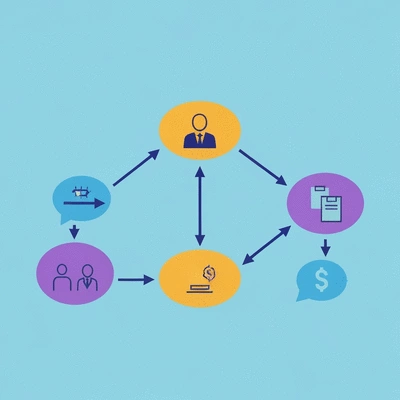Understanding Employment Settlement Agreements

Posted on: 2025-10-15
By: Sarah Thompson
When navigating the complexities of employment disputes, understanding settlement agreements can be the key to ensuring both parties reach a fair resolution. How well do you know the ins and outs of these agreements? Let’s dive into the valuable lessons you can learn about them.
What You Will Learn
- Settlement agreements are legally binding contracts that help resolve employment disputes and protect both parties' interests.
- These agreements typically include terms regarding severance pay, confidentiality, and mutual releases, ensuring clarity for all involved.
- Independent legal advice is crucial for employees to fully understand the implications of signing a settlement agreement.
- Recognizing key differences between settlement agreements and employment contracts is vital for informed decision-making.
Key Differences Between Settlement Agreements and Employment Contracts
Understanding the distinct functions of settlement agreements and employment contracts is vital for both employees and employers.
Employment Contract
- Sets the terms of employment, such as roles, responsibilities, and remuneration.
Settlement Agreement
- Addresses specific disputes and outlines the terms for resolution.
Key Benefits of Settlement Agreements
- Facilitate quick resolutions to disputes
- Reduce legal costs for both parties
- Maintain confidentiality and protect reputations
Common Features of Both Agreements
- Legally binding contract
- Clarity on terms and obligations
Understanding Settlement Agreements in Employment Disputes
When dealing with employment disputes, understanding the nuances of various agreements is crucial. One such agreement is the settlement agreement, which can be a powerful tool for resolving disputes amicably. Let's break down what a settlement agreement actually is and why it plays a significant role in the workplace. If you're facing a dispute, it's helpful to understand understanding UK workplace disputes and how they are typically resolved.

A settlement agreement is a legally binding contract between an employer and an employee, typically to resolve a dispute or potential claims. This agreement often outlines the terms under which the employee agrees to settle their claims, usually in exchange for a financial settlement. Knowing the ins and outs of these agreements can make a difference in how you navigate your employment rights.
What is a Settlement Agreement?
In simplest terms, a settlement agreement is an arrangement between an employer and an employee designed to settle any disputes, such as claims of unfair dismissal or workplace grievances. Once signed, it prevents the employee from pursuing further legal action regarding the matter addressed. This process provides closure for both parties and can help maintain a positive working relationship.
- Legally binding contract
- Typically includes a financial settlement
- Prevents future claims related to the dispute
It's essential to read the agreement thoroughly before signing, ensuring you understand all terms and conditions. If you're unsure, seeking professional legal advice can help clarify any uncertainties. At Solicitors No Win No Fee, we emphasize the importance of understanding your legal rights and options in these situations.
The Purpose of Settlement Agreements in Employment
Settlement agreements serve multiple purposes in the workplace. They allow for swift resolution of disputes without the need for lengthy and costly litigation. By opting for a settlement agreement, both parties can save time, stress, and resources. Moreover, these agreements can include confidentiality clauses, which help protect both the employer's reputation and the employee’s privacy. For more insights into how such agreements can help, explore resolving unfair dismissal disputes in the UK.
- Facilitate quick resolutions to disputes
- Reduce legal costs for both parties
- Maintain confidentiality and protect reputations
Understanding these purposes can empower employees to negotiate better terms tailored to their situations. Remember, the aim is to reach an agreement that feels fair and just for all involved.
Key Differences Between Settlement Agreements and Employment Contracts
While both settlement agreements and employment contracts are legal documents, they serve different functions. An employment contract establishes the terms of employment from the outset, while a settlement agreement is typically used to resolve issues that arise during or after the employment relationship.
- Employment Contract: Sets the terms of employment, such as roles, responsibilities, and remuneration.
- Settlement Agreement: Addresses specific disputes and outlines the terms for resolution.
Recognizing these differences is vital for employees and employers alike. It ensures that everyone understands the context and implications of the agreements they are entering into. If you have questions or need assistance, feel free to reach out—I'm here to help!
Pro Tip
When negotiating a settlement agreement, always ensure you understand the full scope of what you are signing. Consider including specific terms such as non-disclosure clauses or references to any potential future claims. This can protect your interests and provide clarity for both parties moving forward.
Frequently Asked Questions about Settlement Agreements
- What is a settlement agreement?
- A settlement agreement is a legally binding contract between an employer and an employee, used to resolve employment disputes or potential claims, often involving a financial settlement.
- Why are settlement agreements used in employment?
- They are used to facilitate swift resolution of disputes, reduce legal costs, maintain confidentiality, and prevent future legal action related to the dispute.
- How do settlement agreements differ from employment contracts?
- An employment contract sets the initial terms of employment (roles, responsibilities, remuneration), while a settlement agreement addresses specific disputes that arise during or after the employment relationship.
- Is independent legal advice necessary before signing a settlement agreement?
- Yes, independent legal advice is crucial for employees to fully understand the implications, terms, and conditions of the agreement before signing.
- What are some common features included in settlement agreements?
- Common features include clauses related to severance pay, confidentiality, mutual releases, and undertakings not to pursue further legal claims.
Recap of Settlement Agreements in Employment Disputes
As we've discussed, settlement agreements play a crucial role in resolving employment disputes. These legally binding contracts help both employers and employees reach a mutual decision without protracted legal battles. The primary purpose is to provide a clear, structured way to settle disputes while ensuring that both parties understand their rights and obligations.

Throughout this section, we delved into the various components and scenarios where settlement agreements can be beneficial. Now, let’s highlight some key takeaways to keep in mind as you navigate the landscape of employment disputes.
Key Takeaways on the Functionality of Settlement Agreements
- Settlement agreements are designed to resolve disputes amicably and protect both parties' interests.
- They typically include terms related to severance pay, confidentiality, and mutual releases, ensuring clarity.
- Independent legal advice for employees is essential to ensure that they fully understand the implications of the agreement.
- Understanding the various types of claims that can be settled can help you know what options are available.
Each of these points underscores the importance of having a well-drafted settlement agreement. It not only helps in achieving a fair outcome but also lays the groundwork for potential future interactions between the employer and employee.
Next Steps: Seeking Legal Advice and Further Resources
If you find yourself facing an employment dispute, the next step is to seek legal advice. Consulting with a solicitor experienced in employment law can help clarify your position and ensure that your rights are protected. At Solicitors No Win No Fee, we focus on making legal information accessible and understandable, guiding you through the nuances of your situation.
Additionally, consider exploring further resources that can provide insight into similar cases or legal updates. Whether it’s through reputable websites or legal forums, the more informed you are, the better equipped you'll be to handle your situation.
Utilizing Mediation and Arbitration as Alternative Dispute Resolution Methods
Aside from settlement agreements, mediation and arbitration are viable methods for resolving employment disputes. Both approaches can help avoid the stress of litigation and lead to quicker resolutions.
- Mediation involves a neutral third party who facilitates discussions between the parties to help them reach a mutually agreeable solution.
- Arbitration is more formal, where a neutral arbitrator makes a binding decision after hearing both sides.
- Both methods can be less adversarial and promote better long-term relationships between employers and employees. For more information on similar legal processes, you might find our guide on understanding No Win No Fee claims helpful.
By considering these alternatives, you can explore more flexible, constructive paths to resolving disputes in the workplace, reinforcing our mission at Solicitors No Win No Fee to empower individuals with the knowledge they need to navigate their legal options confidently.
Recap of Key Points
Here is a quick recap of the important points discussed in the article:
- Settlement agreements are legally binding contracts that resolve employment disputes amicably.
- They often include terms related to severance pay, confidentiality, and mutual releases.
- Independent legal advice is crucial for employees to fully understand the implications of the agreement.
- Utilizing settlement agreements can save time and reduce legal costs compared to litigation.
- Understanding the differences between settlement agreements and employment contracts is vital for all parties involved.
 Did you know that many tenants are unaware of their rights regarding housing disrepair? Understandin
Did you know that many tenants are unaware of their rights regarding housing disrepair? Understandin
 In today's uncertain job market, knowing your rights when it comes to termination is more crucial th
In today's uncertain job market, knowing your rights when it comes to termination is more crucial th
 In the world of serious injury claims, navigating financial challenges can be daunting. Interim paym
In the world of serious injury claims, navigating financial challenges can be daunting. Interim paym
